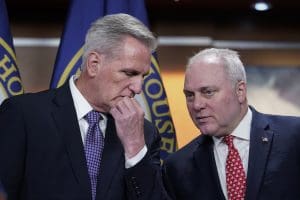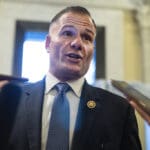House Republican leaders want to shut down the government again
GOP Whip Steve Scalise is urging his caucus to oppose even a brief continuing resolution to avert a holiday crisis.

With federal government funding about to expire on Dec. 16, the Democratic majority in Congress is set to pass a one-week temporary extension to avert a partial government shutdown.
The House Republican caucus is fighting the continuing resolution and pushing for a government shutdown.
The Hill reported that in a memo sent to his caucus on Tuesday, House Minority Whip Steve Scalise — who will be the majority leader in the new Congress — instructed every House Republican to vote against the stop-gap legislation.
“This one-week continuing resolution is an attempt to buy additional time for a massive lame-duck spending bill in which House Republicans have had no seat at the negotiating table,” the Louisiana Republican said.
On Tuesday, the House and Senate appropriations committee chairs and the top Senate Republican appropriator agreed on a framework for a one-year appropriations bill for the entire federal government.
In a statement, Senate Appropriations Committee Chair Pat Leahy announced:
Today, Vice Chairman [Republican Alabama Sen. Richard] Shelby, Chair [Democratic Connecticut Rep. Rosa] DeLauro, and I reached a bipartisan, bicameral framework that should allow us to finish an omnibus appropriations bill that can pass the House and Senate and be signed into law by the President. The pain of inflation is real, and it is being felt across the federal government and by American families right now. We cannot delay our work any further, and a two-month continuing resolution does not provide any relief. I look forward to continuing to work with my friend, Vice Chairman Shelby, and Chair DeLauro over the next week to finish the job the American people sent us here to do.
It will take congressional leaders some time to turn this framework into an actual bill to continue funding the federal government. Senate Majority Leader Chuck Schumer said Monday that he will bring up a seven-day temporary spending bill this week to avert a shutdown and give leaders time to finalize the text.
The House Republicans, who will hold a narrow majority starting in January but are currently still in the minority, have vowed to oppose both measures.
According to Newsweek, Minority Leader Kevin McCarthy, who hopes to become House speaker in January but is struggling to find the needed votes to win the job, told Fox News on Dec. 6: “We are 28 days away from Republicans holding the gavel. We would be stronger in every negotiation. So any Republican that is out there trying to work with them is wrong. Why would you not wait? Why would you want to work on anything if we have the gavel inside Congress? Wait till we are in charge.”
On Tuesday, the California Republican reportedly told his caucus that he is a “hell no” on the year-long deal.
“As I said last week, Republicans will soon be in the majority and in the driver’s seat to fight for our priorities,” McCarthy tweeted. “That’s why every Republican should be a NO on Democrats’ lame-duck omnibus bill.”
Both the omnibus spending bill and the weeklong continuing resolution will require bipartisan support in the Senate — where a 60-vote supermajority is needed to advance nearly all legislation — but just a simple majority in the House. As such, the Democratic House majority can pass both without a single GOP vote.
Texas Republican Rep. Chip Roy blasted both the temporary continuing resolution and the one-year framework, according to Politico.
“We’ll have a short-term [continuing resolution] so we can let Richard Shelby build a new monument to himself. No. Enough of that crap,” Roy told reporters.
Senate Minority Leader Mitch McConnell has largely ignored McCarthy’s demands and pushed for the omnibus deal.
Throughout the current Congress, House Republicans have repeatedly voted against legislation to keep the government funded.
In recent decades, they have frequently forced government shutdowns in unsuccessful attempts to gain leverage to force major cuts to safety net programs like Medicare and Medicaid and repeal the Affordable Care Act, commonly known as Obamacare.
These partial shutdowns not only have meant the closing of national parks, disruptions at federal government agencies, and hundreds of thousands of federal workers going without a paycheck, but also have been shown to have hurt the national economy.
In late 2018 and early 2019, Republicans orchestrated the longest government shutdown in U.S. history, in a failed attempt to make the American taxpayers fund then-President Donald Trump’s proposed southern border wall. Trump ran in 2016 on an oft-repeated promise that he would get Mexico to pay for the entire project, but failed to do so.
Though most of that shutdown took place while she was House minority leader, McCarthy said in January 2019 that the shutdown was somehow the fault of Rep. Nancy Pelosi (D-CA). “I hope they come back with a serious offer this time,” he told Fox News. “But, as you see from that press, this is really her shutdown because she wants to shut the government down for that point.”
Three weeks later, the shutdown ended when Trump gave up on the demand for wall funding.
Published with permission of The American Independent Foundation.
Recommended

Direct mailers distort California Democrat Will Rollins’ record
Rollins, a former federal prosecutor, is challenging incumbent GOP Rep. Ken Calvert.
By Jesse Valentine - April 25, 2024
Republican Laurie Buckhout attends event hosted by convicted sex offender
Harvey West, who pleaded guilty in 2000 to taking indecent liberties with children, has multiple ties to the North Carolina Republican Party.
By Jesse Valentine - April 17, 2024
GOP Rep. Zach Nunn suggests laws against hate crime aren’t needed
Hate crimes in the United States rose from 2022 to 2023.
By Jesse Valentine - April 15, 2024







































































